|
|
|
Sort Order |
|
|
|
Items / Page
|
|
|
|
|
|
|
| Srl | Item |
| 1 |
ID:
115629


|
|
|
|
|
| Publication |
2012.
|
| Summary/Abstract |
This paper presents findings from a study of low-income households in Great Britain which explored households' strategies for coping both with limited financial resources in the winter months, when demand for domestic energy increases, and, in some cases, with cold homes. The study combined a national survey of 699 households with an income below 60 per cent of national median income with in-depth interviews with a subsample of 50 households. The primary strategy adopted by low-income households to cope with financial constraint was to reduce spending, including spending on essentials such as food and fuel, and thereby keep up with core financial commitments. While spending on food was usually reduced by cutting the range and quality of food purchased, spending on energy was usually reduced by cutting consumption. Sixty-three per cent of low-income households had cut their energy consumption in the previous winter and 47 per cent had experienced cold homes. Improvements to the thermal performance of homes reduced but did not eliminate the risk of going cold as any heating cost could be a burden to households on the lowest incomes. Householders' attitudes were central to their coping strategies, with most expressing a determination to 'get by' come what may.
|
|
|
|
|
|
|
|
|
|
|
|
|
|
|
|
| 2 |
ID:
192063
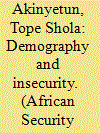

|
|
|
|
|
| Summary/Abstract |
Insecurity is a prominent phenomenon that threatens the peace and development of Africa in general and particularly, the Lake Chad Basin [LCB]. One of the factors driving the menace is the phenomenon of youth bulge. This article argues that young people with poor economic prospects are liable to be recruited for violence. Situated within the grievance model, the article shows how youth make up the larger percentage of protesting, violent and armed groups in the region and presents evidence of how grievance against deprivation moves demography to exacerbate insecurity. The article adopts a qualitative approach and relies on secondary data sourced from briefs, government reports, peer-reviewed journal articles and internet sources. The findings show that the endless supply of children and young people in the LCB is a major factor driving insecurity. By examining the phenomenon of Almajiri, child soldiers and youth radicalisation as enablers of conflict and insecurity in the LCB, the article concludes that population explosion amid a lack of resources leads to grievance and fuels insecurity. This is significant given the paucity of literature on the incidence of demography and insurgency in the LCB; which has become a theatre of insecurity in Africa.
|
|
|
|
|
|
|
|
|
|
|
|
|
|
|
|
| 3 |
ID:
084030
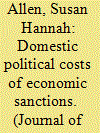

|
|
|
|
|
| Publication |
2008.
|
| Summary/Abstract |
While a great deal of attention has been to paid to whether or not economic sanctions work, less energy has been devoted to exploring the causal mechanisms that lead to the success or failure of sanctions policies. Often, it is assumed that the population is one important source of political costs for targeted leaders, but this assumption has not been tested. Are sanctions related to an increase in antigovernment activity? How does the domestic political system of the targeted state affect the likelihood of this antigovernment behavior? The findings presented here suggest that sanctions may increase antigovernment activity, but that increase is mitigated by the domestic political structures of the target state. In autocratic targets, political violence is less likely to occur when sanctions are in place. For sanctions against autocratic states to be costly, it appears that the political costs needed to alter behavior must be generated internationally rather than domestically.
|
|
|
|
|
|
|
|
|
|
|
|
|
|
|
|
| 4 |
ID:
074969


|
|
|
|
|
| Publication |
2006.
|
| Summary/Abstract |
This paper analyses the number of terrorist attacks and their outcomes in the period 1997-2004. We investigate the hypotheses that deprivation is the underlying cause of terrorism and that geopolitical contexts cannot be ignored. The results from econometric OLS cross?country testing of these hypotheses with data for two large regions of Eurasia seem to confirm our hypotheses, given that the determinants of terrorism differ in the two geopolitical areas and the number of terrorist incidents is negatively associated with the level of development, the literacy level and ethnic fractionalization, being positively related to mineral reserves, non?democratic political regimes and participation in international organizations.
|
|
|
|
|
|
|
|
|
|
|
|
|
|
|
|
| 5 |
ID:
093495
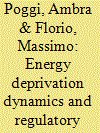

|
|
|
|
|
| Publication |
2010.
|
| Summary/Abstract |
The typical ingredients of energy reforms in the European Union (EU) in the 1990s were full or partial privatization, vertical disintegration and liberalization. This paper analyses the effects of energy reforms on the probability of households experiencing deprivation, defined as difficulty in paying the bills. We use two sets of micro-data. First, the European Community Household Panel (ECHP), a large EU survey, offers evidence on people who report having been unable to pay scheduled utility bills. We consider seven European countries: Denmark, Belgium, France, Ireland, Italy, the Netherlands and Spain, and eight ECHP waves (1994-2001), with around 28,000 observations. Second, we also use micro-data from the European Statistics on Income and Living Conditions survey (EU-SILC) 2004-2005, with around 84,000 observations. The countries included are Belgium, France, Ireland, Italy, Spain, Austria, Finland, Luxembourg, Norway and Sweden. As indicators of regulatory reforms in the same countries and years we use ECTR (formerly REGREF), a database provided by the OECD. In both samples we find evidence that privatization increases the probability of households experiencing deprivation. Vertical disintegration has a similar effect and also increases the persistence in the status of household deprivation. Liberalization has no statistically significant effect. We discuss possible interpretations of these findings.
|
|
|
|
|
|
|
|
|
|
|
|
|
|
|
|
| 6 |
ID:
179716


|
|
|
|
|
| Summary/Abstract |
The aim of this research is to identify energy consumption profiles that explain the difference between actual and theoretical energy consumption (the energy performance gap) in the residential sector using latent profile analysis (LPA). The resulting profiles inform behavioral and socio-demographic differences in consumption patterns among households and help explain inconsistencies in prior research on the energy performance gap. This research demonstrates that under-consumption of energy compared with the theoretical measure is partially explained by behavior related to poverty and deprivation. To address this, preventive measures should be put in place that focus on renovation or social housing to enable the poorest households to heat their dwellings adequately. Particular attention could also be paid to households that consume the most to avoid bias in energy forecasting models.
|
|
|
|
|
|
|
|
|
|
|
|
|
|
|
|
| 7 |
ID:
185188
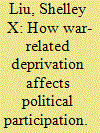

|
|
|
|
|
| Summary/Abstract |
How does civil war affect citizen engagement with democracy? Civilians who live through warfare face numerous disruptions to everyday life that can have permanent effects on political engagement even after peace is achieved. This article analyzes the role of depressed living standards resulting from education loss during the Liberia Civil War as a case study of war-related deprivation. I argue that the negative effects of war on education and economic outcomes clash with the expectations that citizens have for postwar democracy, with adverse consequences for political participation. I demonstrate support for this argument using a mixed methods approach, combining qualitative interviews with census, voting, and Afrobarometer survey data. I leverage a difference-in-differences identification strategy to causally identify the negative impact of conflict on human capital for a generation of young adults, and on the downstream consequences of disruptions in education on political participation. Results indicate that children who were of school age during the civil war are differentially less likely to have any formal schooling by the end of the war. I further find that educational deficiencies disproportionately decrease postwar job prospects, breeding resentment against the newly elected government. This extends to political participation: those who lost out on educational opportunities due to war exhibit lower political engagement and less desire to engage with democratic processes.
|
|
|
|
|
|
|
|
|
|
|
|
|
|
|
|
| 8 |
ID:
180243
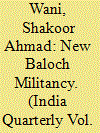

|
|
|
|
|
| Summary/Abstract |
Since the early 2000, Balochistan is yet again embroiled in a cobweb of violence after a hiatus of more than two decades. The Baloch nationalist militancy began to reinvigorate after the seizure of power by General Pervez Musharraf in 1999. Musharraf marginalised the moderate Baloch nationalists and repressed dissident voices. The differences over power and resource sharing escalated quickly into a full-blown armed struggle once Musharraf used indiscriminate force to subdue opposition against his regime. This article examines the proximate and long-term structural factors that led to the resurgence of armed militancy at the turn of the twenty-first century. It analyses the new drivers and dynamics of the present conflict that make it more virulent and lend it a distinctive character.
|
|
|
|
|
|
|
|
|
|
|
|
|
|
|
|
| 9 |
ID:
107516


|
|
|
|
|
| Publication |
2011.
|
| Summary/Abstract |
This paper describes the development of a series of models for predicting the incidence of fuel poverty in England at a small-area level and examines the adequacy of the modelled results in informing our understanding of the geography of fuel poverty. This paper summarises the development of alternative approaches to model specification based upon different approaches to the treatment of household income. Since 2003 small-area fuel poverty estimates have been widely used to inform affordable warmth policies and local targeting of fuel poverty programs. Whilst improvements in data sources and methods in recent years provide an opportunity to better understand the spatial distribution of fuel poverty, these analyses suggest that our understanding of the incidence and spatial distribution of fuel poverty is highly sensitive to the way in which household incomes are measured.
|
|
|
|
|
|
|
|
|
|
|
|
|
|
|
|
| 10 |
ID:
109787


|
|
|
|
|
| Publication |
2011.
|
| Summary/Abstract |
This article attempts to consolidate theorizing about the radicalization of Western homegrown jihadists. Five major models of radicalization are reviewed. The commonalities and discrepancies among these models are identified and analyzed in the context of empirical evidence in the field of terrorism research and social psychology. Three psychological factors emerge as contributors to radicalization: group relative deprivation, identity conflicts, and personality characteristics. Avenues for future research concerning the radicalization of homegrown jihadists are suggested, focusing on research that may not only be practical for counter-terrorism, but also feasible given the challenges of research with radicalized individuals.
|
|
|
|
|
|
|
|
|
|
|
|
|
|
|
|
| 11 |
ID:
161100
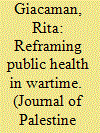

|
|
|
|
|
| Summary/Abstract |
This article traces the research trajectory of the Institute of Community and Public Health (ICPH) at Birzeit University, whose work focuses on life and health outcomes for Palestinians living in chronic warlike conditions under Israeli settler-colonial rule. Over decades of field-based work, ICPH researchers came to the realization that medicalized responses to trauma contributed to concealing the social and political meaning that Palestinians attribute to their collective experience. By adopting an approach that linked the biological/biomedical sphere to the political sphere through the concept of suffering, and exposing the sociopolitical conditions of life and the collective trauma inducing nature of Israeli military occupation and repression, ICPH's research has allowed for the simultaneous personalization of war and politicization of health. In addition to discussing some of the health problems identified by ongoing investigations, the article also touches on the ways in which institution building and research production are linked to the capacity of Palestinians to endure and resist violation in their struggle for justice.
|
|
|
|
|
|
|
|
|
|
|
|
|
|
|
|
|
|
|
|
|